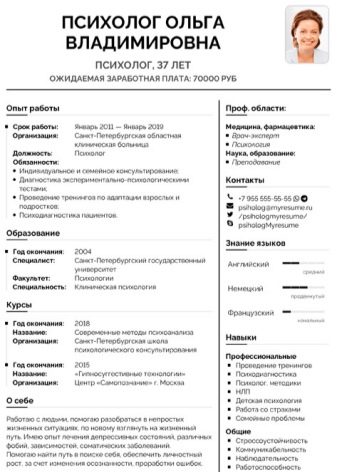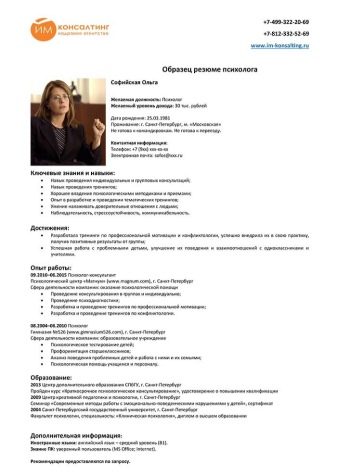Psychologist's resume: structure and features of filling

A well-written resume can positively influence the employer's decision on employment. A competent presentation of the professional skills and personal qualities of a psychologist can dispose the future employer for further beneficial cooperation. The resume of a modern specialist in the field of psychology should be clearly structured, include a certain set of information. It is also worth attaching a cover letter to increase efficiency.
Resume structure
The structure of your resume can vary based on several factors. Purpose of creating a resume: for a job or for a competition... Also, CVs differ depending on the specialization of the psychologist: a psychologist-teacher in a school or preschool educational institution, a clinical psychologist, a family counselor, etc. Nevertheless there are a number of general points that should definitely be highlighted in a psychologist's resume.

basic information
The first point is to indicate the basic information about the applicant: last name, first name, patronymic, as well as residence address, phone number and email address.
Education, including professional development and additional courses
It is worth indicating the basic education in the specialty (higher, secondary vocational, other) with the year of graduation and educational institution.
Experience with an indication of the functions performed
We describe in detail the work experience: time period of work, organization, position held, as well as responsibilities. For a counselor psychologist, the functions can be in the following areas.
- Individual and group consultations.
- Psychodiagnostic work.
- Development of trainings (motivational, personal growth, etc.).
- Help in resolving conflicts within the team.
- Preventive work aimed at preventing professional burnout. This item should not include all places of work, but only work in the specialty.

Work format (for counseling psychologists)
It is worth indicating in what format you work: trainings, individual and group consultations, diagnostics, etc.
Implemented programs (for educational psychologists)
For applicants looking for work in educational institutions, information about state programs implemented as part of the work will be relevant.
Professional achievements
These can be awards, academic degrees, participation in scientific conferences, scientific and research activities. When specifying conferences it is worth indicating specific information with the name, date and topic of the speech.
If the applicant has a scientific degree by profession, this is worth pointing out, and the same applies to ongoing scientific and research activities.

Professional skills
This point can rightfully be considered the most important, because it is on it that the employer will evaluate the applicant. It is worth indicating here everything that you can do within the profession. Particular attention should be paid to modern working methods and ICT skills. A modern employer is looking for a modern professional. For example, a school psychologist's resume may contain skills in the following professional areas:
- prevention and early detection of problems;
- psychodiagnostics of personality;
- analysis of products of activity;
- individual and group consultations;
- drawing up psychological characteristics and conclusions;
- educational trainings and consultations for parents.

Personal qualities
This item should include the personal qualities of the applicant that are directly related to the job. It is not necessary to indicate that the applicant, for example, is positive. The employer may consider this unnecessary information. A practicing psychologist can indicate the following personal qualities:
- a responsibility;
- purposefulness;
- focus on results;
- sociability;
- attentiveness;
- stress tolerance;
- initiative;
- mobility;
- independence;
- discipline;
- punctuality;
- equilibrium;
- benevolence;
- responsiveness;
- tact;
- self-control;
- persistence;
- sensitivity.
It is not worth listing all the qualities that only come to mind. The resume should be written as honestly as possible.

Filling rules
There are a number of rules to follow to create an effective resume.
- Please include actual professional experience. If you don't have experience, it doesn't matter, you shouldn't invent it. Indicate your interest in starting a career.
- Describe real professional skills... When listing your professional skills, first of all, pay attention to the key ones and only then to all related ones.
- Avoid unnecessary information. A resume does not require you to complete a biography, names of children, and number of wives. Limit yourself to your professional life.
- Structure. Give your resume a clear structure and a nice look.
- Make it concise. Try to mix information into short sentences. The minimum of words is the maximum of information.
- Don't forget about the photo... It can be a professional portrait or amateur photography in the process of work, the main thing is that the photo should illustrate yours only from the best side.
- Indicate knowledge of foreign languages. Knowledge of languages in the modern world is vital. Be sure to indicate which ones you own and at what level.
- Write about yourself as honestly as possible... You shouldn't come up with anything, because you will continue to cooperate with these people. Truth is always the best solution.

How to write a cover letter?
A cover letter can play an important role in the recruiter's recruiting process. The letter will draw attention to your candidacy, provided it is correctly drawn up. A cover letter, like a resume, has its own structure.
- Greetings and messages “Hello, Ivan Ivanovich. My name is…"
- Introductory phrase "This letter is a response to the vacancy ..."
- Basic information. This part of the letter contains information about experience, education, professional skills and achievements. In fact, a cover letter is a summary of the resume, but here the applicant has the right to indicate only the most beneficial information in order to attract the attention of the recruiter to his resume.
- To attract attention... Here it is necessary to interest the recruiter. It can be a couple of words about your ideas, desires for development in a professional direction, ambitions, as well as the answer to the question "Why should we accept you?"
The job of the applicant is to prove himself from the best side.

Examples of
Sample resume of a psychologist-conflictologist.
Basic information of the applicant.
FULL NAME: Ivanov Pyotr Sergeevich.
Education: higher (TGPU named after L. N. Tolstoy'16).
Additional education: Refresher courses in the specialty "Psychologist - Conflictologist".
Work experience:
2016-2017: Sberbank PJSC.
Position: HR psychologist.
Responsibilities: resolving and preventing conflicts within the team, conducting trainings on team building, psychodiagnostics, prevention and setting a favorable psychological climate, conducting psychological games and seminars, educating the team, conducting individual consultations.
2017-2019: JSC Norilsk Mining and Metallurgical Plant named after A. P. Zavenyagin ".
Position: psychologist-conflictologist.
Responsibilities: individual and group consultations, development and implementation of motivational trainings, trainings for personal growth, preventive work to prevent professional burnout, work with the team.
Professional achievements:
Author of the book: "Conflict of interest in production: solutions."
Professional skills:
- prevention and early detection of emerging problems in the team;
- personality psychodiagnostics;
- individual and group consultations with staff;
- development and implementation of trainings (work with motivation for success, business, role-playing games);
- assessment of candidates for work (conducting psychodiagnostics);
- dismissal or reduction of employees.
Personal qualities:
- a responsibility;
- purposefulness;
- focus on results;
- sociability;
- stress tolerance;
- initiative;
- punctuality;
- equilibrium;
- benevolence;
- responsiveness;
- persistence.










